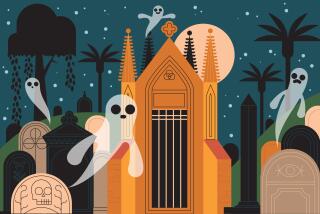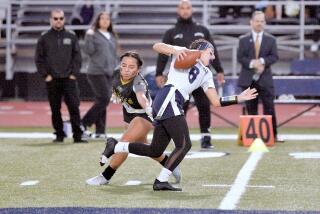THE URBAN LANDSCAPE : Angelenos Turn to Technology to Create Holiday Atmosphere
Angelenos are at a distinct disadvantage when it comes to Christmas. There is no cold to draw you to the hearth, and there often isn’t even a hearth. Worse, there is never any snow to transform the palm-lined boulevards into any kind of winter wonderland.
Luckily, we know what to do about such natural shortcomings here in California: Use technology. Every year, homes all around the Westside turn into fairy-tale versions of Santa’s cottage, stationary discos pulsing with colored lights, or billboards of proud home ownership. The miracles of electricity combine with the ingenuity of homeowners to transform parts of this city into something that is, if not wintry, at least Christmasy.
There are very different strategies people use in decorating their houses. The first and simplest one is to string lights, whether colored or plain, around the house, the yard, the trees and whatever surfaces come in handy. The effect can be both chaotic and exuberant, depending on the skill of the decorator. The second is to try to tell a story, whether by putting a manger in the front yard or by outlining Santa and his crew on the top of the roof. This strategy appears to be less popular in our area, perhaps because it is hard to make you believe that there’s anything for Santa to sled on. The third option is to take the house and outline its most salient features.
Two examples of the different strategies face each other across Sunset Boulevard in Beverly Hills. Whoever wields the strings at 806 N. Elm St. has outlined the trees, bushes and part of the house in light, creating a formless and glittering explosion of light. It’s hard to find an order, but the very energy of the decoration seems appropriate for this broad sweep of Sunset. Across the street, however, the owners of 9463 Sunset Blvd. create a monument every year. They outline the contours of the house, the windows, the eaves and the chimney with single strands of lights. They plant poles in their ample yard and turn them into pyramids of lights that mimic a forest of glittering Christmas trees. The effect is almost ghostly, as the large mansion turns into a bright skeleton rising up from the wilds of its estate. In either case, the normally bland architecture of these houses, whose vaguely Norman and Spanish forms often seems at odds with the surrounding subtropical vegetation, disappears into an abstract and captivating play of lines and points. You forget the fact that these are private homes.
Against the austere spectacles of Beverly Hills, some of the multicolored labyrinths I have seen in the tree-lined back streets of areas such as Culver City may seem gaudy but they perform the same function: They transform humble stucco bungalows into magical habitations whose size is limited only by the ladders of the inhabitants. When the lights wrap all around the house and into the top of the trees, you lose all sense of a city divided into rectangles and see instead an open, swirling celebration of our ability to transform our space. It may only work at night, and it may use a lot of electricity, but it is a wonderful fantasy.
Scientists and designers promise us that soon we will not need walls and roofs anymore. Charged particles, lasers and projectors will keep us warm and dry, but they will also define our reality and allow us to turn our world into a scaleless, always-changing and limitless environment. I do not know how much of that promise will be realized, but in the few weeks before the new year, at least some of us experiment with making a liberating, fantastic world. These temporary visions offer us fleeting glimpses of how we may hope not only for peace and understanding, but also for open space that does not separate and divide us but unites and dazzles.
Aaron Betsky teaches and writes about architecture.
More to Read
Sign up for Essential California
The most important California stories and recommendations in your inbox every morning.
You may occasionally receive promotional content from the Los Angeles Times.










